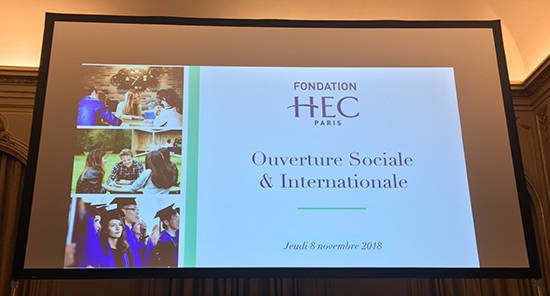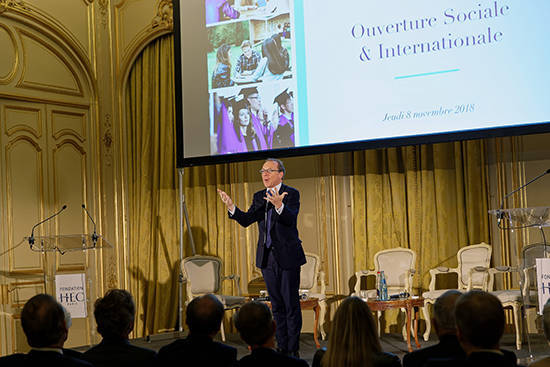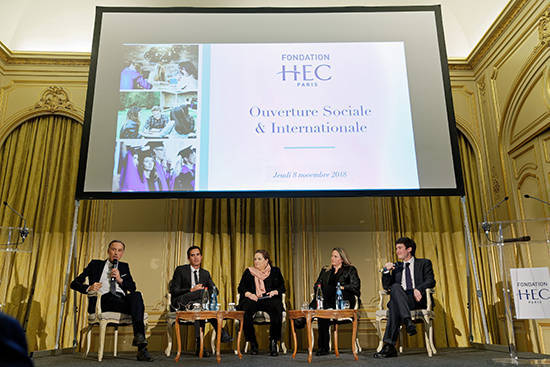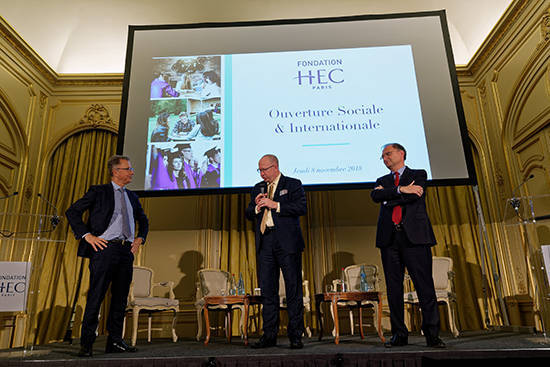HEC Foundation: Striving for Social and International Diversity
“Thanks to you, destinies are changing!” At a soirée held by the HEC Foundation on November 8, Eloïc Peyrache, Associate Dean for HEC Paris Grande Ecole, was quick to praise the organization’s recent work. The event brought together donors and members of the “HEC ecosystem” (professors, students and staff), who discussed the school’s approach to social and international diversity. Their aim was simple: to reaffirm HEC’s dedication to diversity and equal opportunities.

“Speech is a social marker that can be both restrictive and liberating.” For Bertrand Périer (H. 98), a lawyer at the French Council of State and Court of Cassation and Professor of Public Speaking at HEC Paris, eloquence is one of the most effective means of promoting equal opportunities. Fittingly, two HEC students introduced the event by trying to give a quick-fire answer to the following question: “Is equality an opportunity?” Louise Saby (H.20), who had the difficult task of arguing against the motion, managed to turn this constraint into a genuine appeal for diversity, which she sees as “not just an opportunity for improved economic performance, but a means of guaranteeing it.” Constantin Vodé, meanwhile, argued that “striving for equality is human”. He added a personal touch by sharing the poignant tale of his grandfather. Having fled Russia, he never managed to become a doctor in France, an injustice that he bore with wisdom: “he did not get the chance,” explained Constantin, “but that mattered little to him.”

Handing Over the Baton
“HEC: Haute Egalité des Chances”: in honor of the efforts made by the HEC Foundation and its donors, Bertrand Périer came up with an amusing new name for the business school. And for good reason: 18% of students now receive a scholarship from the HEC Foundation. By way of contrast, 5% received a grant from the state for economic reasons in 2008.
Much has changed in recent years, and this is largely thanks to Bertrand Léonard, the President of the HEC Foundation. He saw this event as the right time to hand over the baton to his successor and to take stock of his five years in charge. “More than anything else, I have made equal opportunities my priority,” he said, before recognizing the unerring commitment of HEC and its Foundation. In order to emphasize the extent of this commitment, Léonard provided some facts and figures from the past 4 years: 60% more scholarships awarded by the HEC Foundation (with over 1100 scholarship students today), more than 50 million Euros raised, 48 new major donors…
Léonard finished by sharing his beliefs about HEC, and they arguably capture the school’s identity in the current age. He summed them up in four letters: “1 E and 3 Ds”. The “E” is for Excellence, which Léonard sees as a pre-requisite for HEC. Then comes “D” for Differentiation, which brought him to Dean Peter Todd’s “Deepen and Differentiate” strategy: by differentiating itself, HEC will be able to “become one of the 10 best business schools in the world.” The second “D” is for Digital: although traditional classroom teaching will continue to be at the heart of education at HEC, the school must also integrate the latest technologies (3D, artificial intelligence, online courses) into its teaching methods. And the final “D” is for Diversity: this is a civic and ethical imperative for HEC, given that education is the most reliable means of building a cohesive society.

This imperative was at the heart of the diversity round-table that followed. Boris Walbaum, Co-President and Co-Founder of Article I (an organization helping young people from working-class backgrounds to pursue academic and professional careers in order to become active members of society), argued that whilst the debate on equal opportunities has become “politicized”, diversity is a more recent notion that “hasn’t quite taken root in the minds of most political and economic decision-makers”. Meanwhile, the creator of Foundation 104, Valérie Colloredo (H. 94), was eager to cite the progress made by the HEC Foundation. She then reminded her audience that “a united and determined community can make an enormous difference in the next few years when it comes to equal opportunities”. Entrepreneur Nicolas Hazard (M .08) is the founder of INCO, a group that finances more than 500 green and social start-ups each year: according to Hazard, we are too quick to forget “about the changes since the urban riots in 2005; a number of companies have adopted charters in favor of diversity, but the movement doesn’t have enough force.” Fortunately, he believes that “some sectors, like the digital sector, are moving at a faster rate because they are more in touch with the issue.” A unique point-of-view brought the round-table to a close: it was offered by the conductor Zahia Ziouani, who grew up in Seine-Saint-Denis before creating Divertimento Orchestra 20 years ago. The company’s goal is to make classical music available to all. Drawing on her experience of the world of symphony music, which she believes to be lacking in diversity, Ziouani encouraged the HEC ecosystem to expand further: “HEC must continue to show faith in young people who are using unconventional ideas in order to tread different paths.”

Bertrand Léonard, Peter Todd and Olivier Sevillia
An Abundance of Goodwill
Peter Todd expressed a similar view at the end of the round-table debate: “When it comes to diversity, it is vital that we see concrete improvements.” After pointing out that the campus in Jouy-en-Josas is now home to over 100 different nationalities, HEC’s Dean addressed the school’s next major challenge: “to move from diversity to inclusivity.” Peter Todd was also eager to thank Bertrand Léonard for his warm welcome when he took over at HEC towards the end of 2015, and for his work alongside him thereafter. He then went one step further by announcing the “Bertrand Léonard Bursaries for Equal Opportunities”, which will reward three worthy students each year. Peter Todd finished by welcoming the arrival of the HEC Foundation’s new President, Olivier Sevillia (MBA. 90), Deputy Managing Director of the Capgemini Group, which has worked alongside the Foundation for many years as a committed donor and volunteer.
Olivier Sevillia brought the evening to a close by sharing his vision of the future: he believes that HEC has “a number of incredible opportunities. By changing tack, it can make a genuine impact on the world.” After mentioning plans for a large fundraising campaign in the second semester of 2019, Sevillia revealed what motivated him to take on a challenge that was “hard to resist”: his personal experience of the “social ladder” (his time at HEC was a key step along the way), his total faith in the project that Peter Todd is leading, and, above all, the “abundance of goodwill” among the Foundation’s donors and HEC’s entire ecosystem.